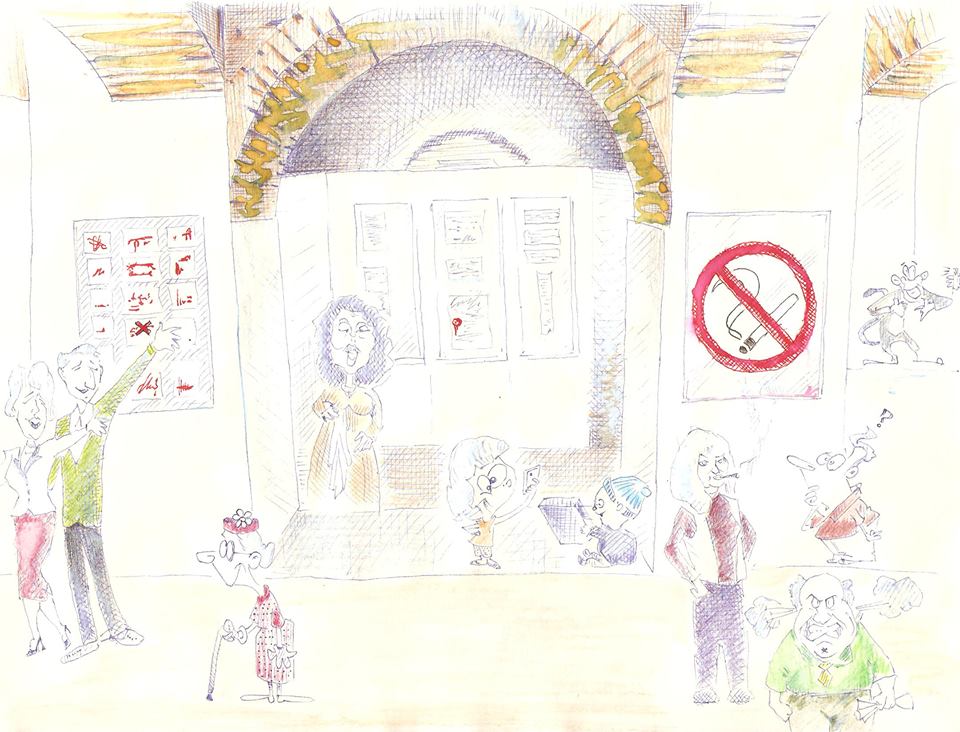
In 1984, viewers from across the region laughed at the skit “Nadrealisti” in which Rizo sells the City Hall of Sarajevo to American tourists for 25,000. Today, 30 years later, we have representatives of the city administration and employees of the National and University Library in Sarajevo.
City Hall was reopened after a long 18-year restoration process. Amidst the restoration, a dispute was underway between the city administration and the National and University Library in Sarajevo (NUL BiH) as to who would occupy the premises once its original appearance had been restored. According to the land register, the building was owned by the State, while the NUL BiH was listed as the primary beneficiary of its use. In November 2003, seven years after the reconstruction started, the Sarajevo Cantonal government adopted a resolution (Sarajevo Canton Official Gazette, n.21/2003) that defined a multipurpose use of the Hall. Under this resolution, the building was to be divided between the city’s central administration, the NUL BiH, and the Museum of the Destruction of City Hall. The resolution included an addendum stating that the Great Hall area was to be used as a public facility while the basement was to be reserved for use as a national restaurant.
Director of the NUL BiH Ismet Ovčina, sees this solution as highly inadequate: “Nowhere in the world does there exist a space that is being occupied by institutions so different in character and levels of governance as are the city administration and the public library. We are intervening because this proposed sharing of space is not practical. Our stance has always been that City Hall, and the books housed within, serves as a symbol of multiculturalism and spiritual inheritance, which objectively take up time and space in all civilizations. According to official documents, this must be respected. Because official ownership of City Hall does, in fact, belong to the State, we must respect the Court and the Council of Ministers, but we should be able to benefit from its use without such limitations, and we will behave as such.”

Mayor of Sarajevo, Ivo Komšić, approaches this issue from a different angle and emphasizes: “All documents concerning the issues surrounding City Hall identify the City of Sarajevo as an investor. This is very important because all investments for its reconstruction were provided through the city’s administration, and, more specifically, through the mayor. Usage permits for City Hall fall under the jurisdiction of the Federal Ministry of Spatial Planning, and this Ministry issued such a permit to the City of Sarajevo. Furthermore, the Council of Ministers issued a resolution that gave the City of Sarajevo the right to use the City Hall. An identical resolution was also issued by the Federal Ministry of Culture and Sport, a signatory of the petition to restore City Hall. Therefore, from a legal standpoint, the matter is clear.”
On 16 June 2014, the Sarajevo Municipal Court ruled that City Hall was not the property of NUL BiH. Komšić states that these were the grounds upon which the Council of Ministers, at the state level of government, gave the use of City Hall to the City of Sarajevo. Employees of the NUL BiH have not provided an official statement regarding this ruling.

118 years after the initial opening of City Hall, 22 years after flames engulfed most of the library’s contents, and 18 years of hard work on reconstruction, leave behind the question: What did we achieve, and what will be left to future generations? The answer: We can provide domestic and international students, scholars and researchers with materials offered by the NUL BiH while city administration employees, museum visitors, and a steady stream of tourists push past each other in hallways saturated with the unavoidable smell of Bosnia’s national cuisine that steadily seeps into every pore of this national monument. Is such an experience really worth 16 million euros?






